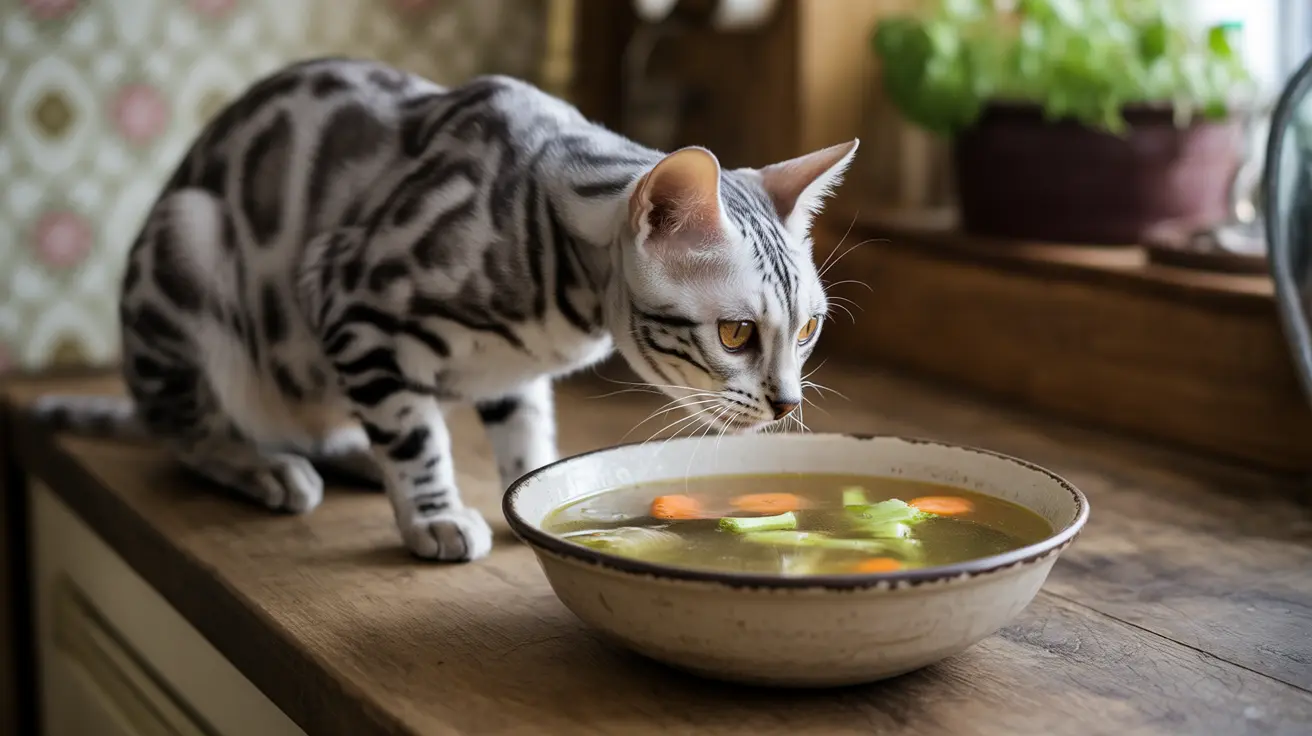For many cat owners, finding ways to keep their feline friends hydrated and healthy is a top priority. Chicken broth often comes up as a potential solution, but the question remains: can cats have chicken broth safely? The answer isn't as straightforward as you might think, and making the wrong choice could put your cat's health at risk.
In this comprehensive guide, we'll explore everything you need to know about feeding chicken broth to cats, including safety considerations, potential benefits, and how to make cat-safe broth at home.
Understanding the Safety of Chicken Broth for Cats
Not all chicken broths are created equal when it comes to feline consumption. While cats can technically consume chicken broth, the safety depends entirely on the ingredients and preparation method.
Safe vs. Unsafe Ingredients
The only truly safe chicken broth for cats is one that contains nothing but chicken and water. Many commercial broths contain ingredients that can be harmful or even toxic to cats, including:
- Onions and garlic (highly toxic)
- Excessive sodium
- Artificial preservatives
- Added seasonings and spices
- MSG and other flavor enhancers
Benefits of Cat-Safe Chicken Broth
When prepared properly, chicken broth can offer several benefits for your feline companion:
Hydration Support
Cats evolved as desert animals and often don't drink enough water. Chicken broth can encourage increased fluid intake, especially for cats who primarily eat dry food.
Appetite Stimulation
The aromatic nature of warm chicken broth can entice picky eaters or cats recovering from illness to eat more regularly.
Nutritional Benefits
Plain chicken broth contains beneficial proteins and minerals that can support your cat's overall health when used as a supplement to their regular diet.
Making Cat-Safe Chicken Broth at Home
Creating safe chicken broth for your cat is simple but requires careful attention to ingredients and preparation:
- Use only fresh, plain chicken meat
- Add clean, filtered water
- Simmer gently for 2-3 hours
- Strain thoroughly to remove all bones and particles
- Allow to cool before serving
- Store excess in the refrigerator for up to 3 days
Serving Guidelines and Portions
When introducing chicken broth to your cat's diet, follow these important guidelines:
- Start with small portions (1-2 teaspoons)
- Monitor for any adverse reactions
- Serve at room temperature or slightly warm
- Use as a food topper or occasional treat
- Don't exceed 10% of daily fluid intake
Frequently Asked Questions
Can cats safely drink chicken broth, and what ingredients should I avoid?
Cats can safely drink chicken broth that contains only chicken and water. Avoid broths containing onions, garlic, salt, or any additional seasonings, as these can be toxic or harmful to cats.
How do I make homemade chicken broth that is safe and healthy for my cat?
Simply simmer plain chicken meat in water without any seasonings, salt, or additives. Strain thoroughly to remove all bones and particles, and let cool before serving.
Is it okay to give my cat commercial chicken broth labeled as "low sodium" or "unsalted"?
Even "low sodium" or "unsalted" commercial broths may contain harmful ingredients like onion or garlic powder. Always check the ingredient list carefully or stick to homemade broth.
What are the health benefits of feeding chicken broth to cats, especially for hydration or illness?
Cat-safe chicken broth can improve hydration, stimulate appetite, provide gentle nutrition during illness, and make dry food more appealing. It's particularly beneficial for cats recovering from surgery or illness.
How much chicken broth can I give my cat, and how should I introduce it to avoid digestive upset?
Start with 1-2 teaspoons and observe your cat's reaction. Gradually increase the amount if well-tolerated, but keep it as a supplement rather than a primary source of hydration. Never exceed 10% of their daily fluid intake.
Remember, while chicken broth can be a healthy addition to your cat's diet when prepared properly, it should never replace their regular balanced meals. Always consult with your veterinarian before making significant changes to your cat's diet, especially if they have existing health conditions.






